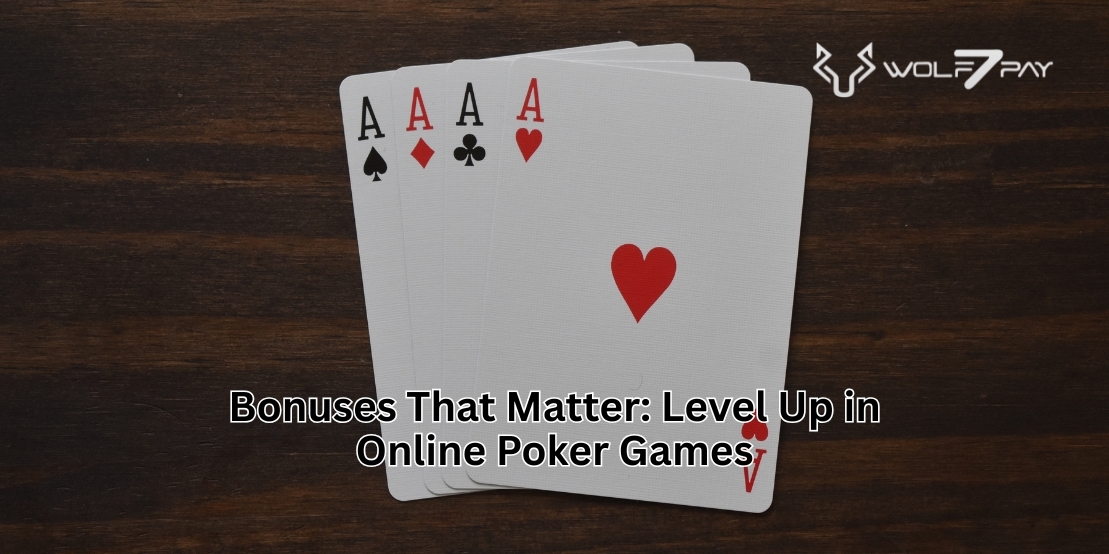When it comes to playing poker online, players often focus on the cards, the strategies, or even the thrill of bluffing—but bonuses are just as important. Whether you’re new to poker or have years of experience, understanding how to make the most of the right bonuses can significantly enhance your online poker journey. The right bonus can boost your bankroll, extend your playtime, and even give you an edge in tough situations. But not all bonuses are created equal.
Let’s break down the types of bonuses that really matter, how to use them effectively, and what to avoid when using them to level up in the world of digital poker.
Understanding the Different Types of Bonuses
Online poker rooms offer a wide range of bonuses, but they usually fall into a few common categories:
1. Welcome Bonuses:
These are offered to new players who register and make their first deposit. Often matched at a certain percentage, these bonuses can give you a strong starting bankroll to explore various tables and tournaments.
2. No-Deposit Bonuses:
As the name implies, no-deposit bonuses are awarded without needing to deposit money. While these are often smaller, they’re a great way to try out real-money poker games risk-free.
3. Reload Bonuses:
Once you've already signed up, reload bonuses come into play when you add more money to your account. They usually mirror welcome bonuses but may come with different wagering or playthrough requirements.
4. Loyalty or VIP Programs:
These are structured rewards systems where you accumulate points by playing. Over time, those points convert into real money, tournament entries, or other benefits.
5. Freeroll Tournament Entries:
Many platforms offer bonus access to special tournaments where you don’t have to pay an entry fee but can still win real money.
6. Cashback Offers:
Some poker rooms return a percentage of your losses over a certain period. This helps soften the blow of a bad streak and encourages continued play.
The Importance of Reading Bonus Terms
Many players make the mistake of grabbing every bonus offer they see without understanding the terms attached. Things like wagering requirements, time limits, eligible games, and withdrawal restrictions can change the entire value of a bonus.
For example, a 100% match bonus up to ₹10,000 might sound amazing, but if you must wager the bonus 30 times within a week, it may be nearly impossible to clear without heavy play—and risk.
Always read the fine print and do the math. A lower bonus with easy-to-meet terms might be more valuable than a huge one with unrealistic conditions.
Strategic Use of Bonuses
Bonuses aren’t just extra cash—they’re tools for growth. Here’s how to use them to your advantage:
Start Small and Learn:
If you’re new, use no-deposit bonuses or low-wager welcome bonuses to explore different poker variants. You’ll learn without putting your own money at risk.
Time Your Reloads:
Look out for reload promotions during holidays, weekends, or special events. Timing your deposit right could mean double the value.
Mix Bonuses with Bankroll Management:
Even with bonus funds, stick to your usual bankroll management strategy. Don’t let a temporary increase in your chip stack tempt you into higher stakes if you’re not ready.
Use Loyalty Points Smartly:
Don’t just let loyalty points pile up. Redeem them for tournament entries where the risk is low, but the payoff could be high.
Watch Out for Multi-Table Bonus Traps:
Some bonuses reward high-volume play. Be cautious—playing multiple tables to chase a bonus can lead to poor decisions and faster losses.
Psychological Boost and Risk Cushioning
Another advantage of bonuses is the psychological boost they offer. When you know part of your bankroll is “free,” you might be more willing to make bold moves, try out advanced strategies, or enter tournaments with higher rewards.
This can help develop your skill set and confidence. That said, never rely entirely on bonus money to carry your game—it’s meant to supplement, not substitute for, solid strategy.
In the heart of your poker journey, the true value becomes clear: Online Poker Games aren't just about chance—they're about making strategic decisions, and bonuses play a role in those decisions. Whether you’re choosing a freeroll over a paid tourney or deciding how aggressively to play with bonus funds, each move shapes your progress.
Common Bonus Pitfalls to Avoid
While bonuses offer many benefits, they can also become traps if misused. Here are a few common pitfalls:
-
Ignoring Terms and Conditions: Always read the fine print before activating any offer.
-
Overplaying for Bonus Clearing: Don’t chase impossible wagering goals—this usually results in loss.
-
Not Tracking Expiry Dates: Many bonuses come with a time limit. If you don’t use them in time, you lose them.
-
Playing Unfamiliar Games: Some bonuses apply only to certain games. Avoid jumping into unknown poker variants just to use a bonus.
Building Long-Term Value Through Bonuses
Bonuses should be part of a long-term poker strategy, not just short-term boosts. If you approach them with patience and discipline, they can help you:
-
Extend your playtime without additional investment
-
Enter tournaments you otherwise wouldn’t consider
-
Practice new skills in low-risk environments
-
Slowly grow your bankroll while maintaining responsible gameplay
Each bonus you accept should be part of a larger plan—an opportunity to play smarter, improve your game, and gradually move up in stakes and skill.
Conclusion
Bonuses matter—not because they guarantee big wins, but because they offer opportunities to stretch your play, cushion your losses, and boost your learning curve. By understanding how they work and how to use them wisely, you don’t just play more—you play better. Whether you’re climbing the poker ladder or sharpening your game, bonuses are one of the most overlooked tools to help you level up and stay ahead.


